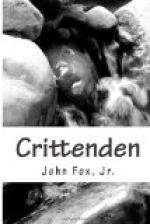Now and then a bullet would have a hoarse sound—that meant that it had ricochetted. At intervals of three or four minutes a huge, old-fashioned projectile would labour through the air, visible all the time, and crash harmlessly into the woods. The Americans called it the “long yellow feller,” and sometimes a negro trooper would turn and with a yell shoot at it as it passed over. A little way off, a squad of the Tenth Cavalry was digging a trench—close to the top of the hill. Now and then one would duck—particularly the one on the end. He had his tongue in the corner of his mouth, was twirling his pick over his shoulder like a railroad hand, and grunting with every stroke. Grafton could hear him.
“Foh Gawd (huh!) never thought (huh!) I’d git to love (huh!) a pick befoh!” Grafton broke into a laugh.
“You see the charge?”
“Part of it.”
“That tall fellow with the blue handkerchief around his throat, bare-headed, long hair?”
“Well—” the other man stopped for a moment. His eye had caught sight of a figure on the ground—on the top of the trench, and with the profile of his face between him and the afterglow, and his tone changed—“there he is!”
Grafton pressed closer. “What, that the fellow?” There was the handkerchief, the head was bare, the hair long and dark. The man’s eyes were closed, but he was breathing. Below them at that moment they heard the surgeon say:
“Up there.” And two hospital men, with a litter, came toward them and took up the body. As they passed, Grafton recoiled.
“Good God!” It was Crittenden.
And, sitting on the edge of the trench, with Sharpe lying with his face on his arm a few feet away, and the tall Cuban outstretched beside him, and the dead Spaniards, Americans, and Cubans about them, Grafton told the story of Crittenden. And at the end the other man gave a low whistle and smote the back of one hand into the palm of the other softly.
Dusk fell quickly. The full moon rose. The stars came out, and under them, at the foot of the big mountains, a red fire burned sharply out in the mist rising over captured Caney, from which tireless Chaffee was already starting his worn-out soldiers on an all-night march by the rear and to the trenches at San Juan. And along the stormed hill-side camp-fires were glowing out where the lucky soldiers who had rations to cook were cheerily frying bacon and hardtack. Grafton moved down to watch one squad and, as he stood on the edge of the firelight, wondering at the cheery talk and joking laughter, somebody behind him said sharply:
“Watch out, there,” and he turned to find himself on the edge of a grave which a detail was digging not ten yards away from the fire—digging for a dead comrade. Never had he seen a more peaceful moonlit night than the night that closed over the battlefield. It was hard for him to realize that the day had not been a terrible dream, and yet, as the moon rose, its rich light, he knew, was stealing into the guerilla-haunted jungles, stealing through guava-bush and mango-tree, down through clumps of Spanish bayonet, on stiff figures that would rise no more; on white, set faces with the peace of painless death upon them or the agony of silent torture, fought out under fierce heat and in the silence of the jungle alone.




